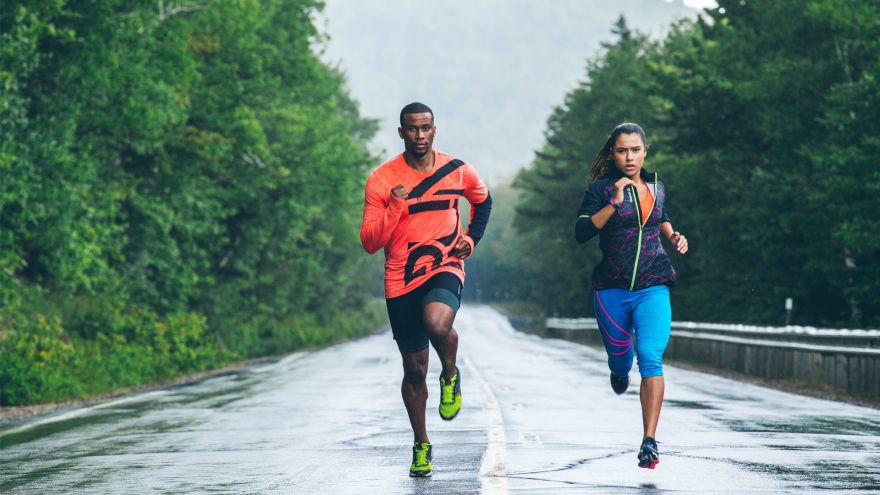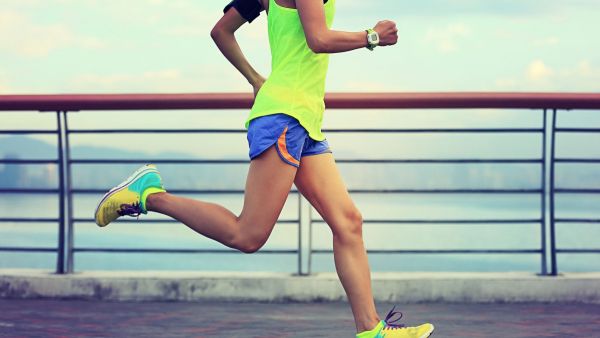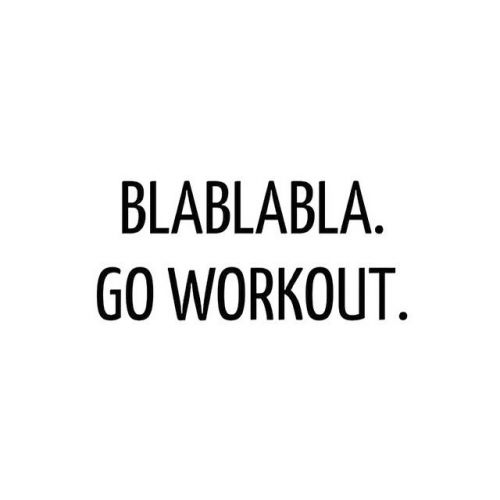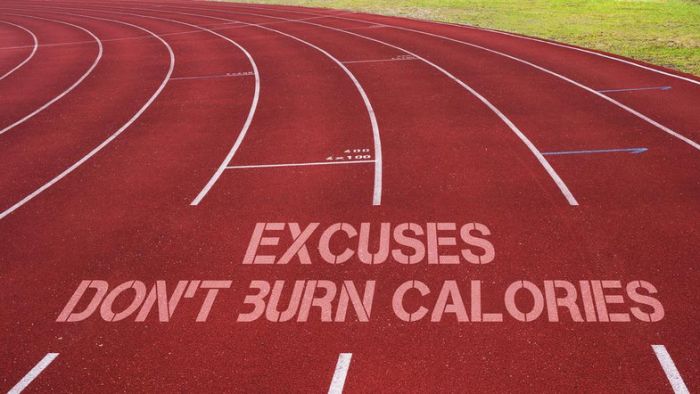How Many Calories Do You Burn When Running?

Pounding away at the gym may not be for you. The throbbing lights, loud music and high tech equipment fit for Olympians is just not everyone’s cup of tea. Thank God for running. For the ones who like to keep their exercise accessible, easy to maintain and free of unnecessary frills, no other form of working out is more appealing. All you need to do is grab a pair of shoes and head off to the local park for a refreshing run.
No parks in close range? Unlike gyms where you have to fret about their opening and closing hours or wait behind a long line to get to your desired exercise machine, no restrictions ever really bother running. Run alongside the pavement in your area, in the wee hours of dawn or the darkness of the night, at your own pace. Heck, you can even run in the rain if you like!
You may often see running being shrugged off as a low intensity workout option. Who ever got a ripped body from a daily running routine? Don’t believe these gym rats. Contrary to what the ignorant will tell you, running makes for great cardio, even greater for weight loss and is recommended by experts all over the world.
Perhaps you’ve heard an old piece of exercise wisdom claiming that you burn about a 100 calories after running a mile. This is a loose claim backed with very little evidence and inaccurate for most runners. When it comes to tying in calorie loss to running, there is no hard and fast rule. Many variables such as weight, age, body type and even the terrain you are running on come into play and are major determinants of just how many calories you are burning, regardless of the number of miles you ring in.
Let’s have a look at what we do know about how a few such factors affects weight loss.
Your Weight Matters
The rule of the thumb is, the more you weigh, the more calories you will burn when running. According to a chart on running by The American Council on Exercise, a 120 pound person burns 11.4 calories in a minute of running or 114 in about 10 minutes. A person weighing 180 pounds, on the other hand, loses 17 calories in a minute or 170 in 10 minutes, when all other factors are held constant.
This is because larger bodies require more energy to move across distances and this translates to greater calorie loss. Well, the good news is, the speed at which you run doesn’t really matter. If you’re a slow runner, simply up the time you spend on the ground until you burn as many calories you’d like.
How Young Are You?
This may not come as a surprise. The younger you are, the more calories you will be burning. And this has little to do with running per se. No matter what form of exercise you opt for or even the calories the body burns naturally when at rest, this rule stands true. This underlying reason here is our body’s metabolism.

As a relatively younger person in the teens or twenties, metabolism is generally quite high and it doesn’t take much to burn calories. From the thirties, though, metabolism declines a little, the body loses muscle, gains fat and it takes a wee bit more effort to burn calories. Not to worry though. Like we’ve said before, a minute or two longer in your running shoes can make all the difference.
Flat or Not
The surface you are running on can influence how many calories you are burning. Flat terrains- for instance, the local park or pavements- require relatively little energy from your body. A person weighing 155 pounds, we’ve found, burns about 128 miles per mile of running.
An inclined surface is a different story altogether. A 155 pound person running in a slope of, say, about 2.5% burns 141 calories per mile. This is a substantial increase with only a little difference in the running surface you choose.
Let’s Count Now
Estimating how many calories you are burning in your running expeditions is easier than ever. There are plenty of apps and online calorie calculators that can do your maths for you, using your age, weight, speed and other such details.
Your best bet, however, is the wearable activity tracking devices that are taking the world by storm such as Fitbit. Much more accurate than punching numbers in an app, these also measure your heart rate, how far you’ve run and presents an overall review of your fitness levels. Besides, you can store your data, set goals and track your progress as you work towards them. With so much going on, you no longer feel the desire to skip out on a fun workout session.
Weight Woes
You’ve been running for days now. You have all the gear you need and are religious about hitting the roads at least once a day. Yet nothing seems to work. You look at the scales and the needle hasn’t moved in the slightest. This can totally kick you off the rails and discourage you. You may find yourself asking the question- what are you doing wrong.
The answer is nothing. You are doing great. Blame the scales. It provides an absolute number which doesn’t reflect what is actually going on inside your body. Maybe you’ve lost tonnes of flab. But have you considered water weight?
To keep you going throughout your long runs, it is natural for you to drink more water and this may show up in the scales to mislead you from tracking your actual weight loss. Don’t forget muscles. It is true that they weigh heavier than fat. And what happens during any workout session is that you burn fat and replace it with muscles. While this is all good for the healthier and fitter you, the numbers on the scales may not look great. Regardless, you are on the right track.
Getting on the scales every single day, hoping for a ginormous leftward shift of the needle will do nothing but demotivate you. You will learn absolute zilch about your fitness level, how much weight you’ve lost and the progress you’ve made, if any. The scales are merely a lagging indicator; you don’t see the work in progress, just the results which take a while. Instead, forget about measuring your weight for a while. Focus on eating healthy, maintaining a lifestyle congruent to your goals and of course, running. No cheating and soon enough, the results will follow.
Why Run Though?
With all said and done, you may still have your reservations about running as a viable workout option. Yes, running does appeal to the aesthetics seeker in your heart. A lone run in the woods makes for great Instagram #fitspiration and sure enough, will elevate you into a fitness guru among your friends.
You will, of course, get your desired lean body you will be running hard for. But wait. There’s more. Running may alter your life forever and with science backing it, there’s no reason why you shouldn’t start running today.
Running makes you happy. The high from a run across the street is a very real phenomenon. Especially if you are currently embroiled in some major depressive episode, running is the instant mood lifter you need.

However, we can’t say for the same sensation in the extremely controlled environment of a gym where you are jostling to get pumped. Running in the fresh air with a gentle breeze blowing through your hair releases the feel-good hormones by our brains and what’s more, researchers say it’s quite similar to addictive drugs in the reaction they cause. I don’t know about you, but I’ve always been looking for the good kind of buzz and running seems to be it.
Mental fitness is an often neglected topic as we discuss our exercise regimes. This is ironic as mental and physical fitness go hand in hand as two sides of the same coin, you can’t have one without the other. If you’re looking to give your brain a bit of boost, start running today.
Running activates and enhances the brain’s neural reserves and this, in English, means you get smarter. Besides, this underestimated little activity helps combat age related mental decline. As empirical studies have shown, older adults who run perform much better on mental tests than peers who don’t. I guess running is the fountain of youth we’ve been searching for all along.
Fitness is a chimera. Wish as we may, we can’t maintain the metabolism of a horse forever. With age, even the most health conscious hippies will notice signs of deterioration. And these appear as early as in one’s twenties. The wear and tear of a life well lived cannot be deterred; you should just embrace it with grace. But yes, something as simple as an hour of running in the neighborhood can make a world of change.
Cardiovascular health, for instance, is something which plagues the best of us. But regular runners, studies have found, are less prone to cardiovascular risk factors than the others. The American Heart Association also says that 150 minutes of running per week can maintain your blood pressure in the healthy range.
Besides, running can also reduce susceptibility to one of life’s greatest spectres, cancer. According to the Journal of Nutrition which conducted a review spanning 170 epidemiological studies, a routine of brisk runs is associated with reduced risk of certain types of cancer, including breast and colon.
While we are on the myriad benefits of running, let’s bust one of the greatest myths surrounding it. Chances are, you’ve been warned about how running is bad for the knees. Well, science says otherwise. Not only does running have no negative correlation with bone health, this easy piece of workout is actually a boon for it.
As we’ve learned from multiple studies and distinguished researchers, running helps increase bone mass and defy age related loss in bone density. What does this mean? If you are concerned with maintaining your bone health over the years or would like to defeat the onset of knee arthritis, it’s time you buy yourself a pair of brand new Nikes and make a run for it.
Remember how we said running might be the much epitomized fountain of youth? Well, now we have proof. Even the smallest bit of physical activity such as going for a 30 minutes run, 5 days in a week, can help you live a longer, improved life.
Let’s have a glance at the different types of lifestyles that, studies show, have gained major improvements with something as simple as a run. Past smokers, by adding a morning run to their daily routine, added 4.1 years to their expected lifespans. Fret not, smokers who can’t seem to kick the habit – this daily workout can add 2.6 more years to your lifespan too. Cancer survivors expanded their lives by 5.3 more years while those with a heart disease gained 4.3. With so much evidence floating around, it would be plain folly to not integrate running into lifestyle. It is, after all, free!
Running Yet?

The best part about running is, you need nothing to start you off besides your willpower. And there’s nothing to hold you back either. There are no beefy gym trainers howling in your ear nor no hard and fast rule that you must adhere to. Run like Phoebe Buffay in Friends for all you like, with your legs flailing about and a wide grin in your face. You don’t need to be a marathon runner to have a good time on the tracks.
Besides, when it comes to fitness in a holistic sense of the word, open for everyone to have a shot at, of any age, body type etc. it doesn’t get better than running. So, without further ado, put your running shoes and out the door you go. Exercising is about to get a lot more fun.
Pin for later

